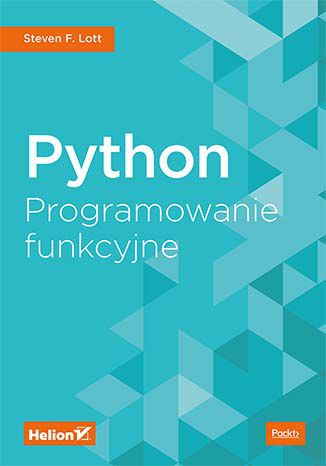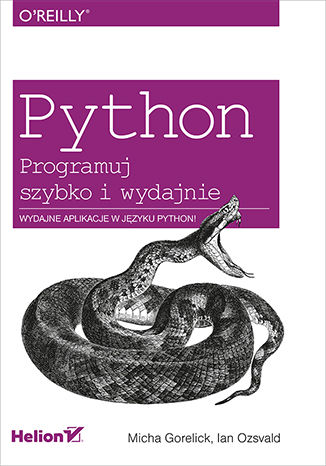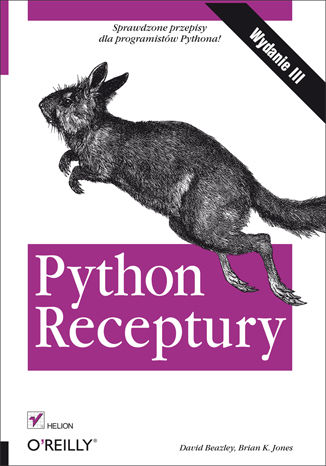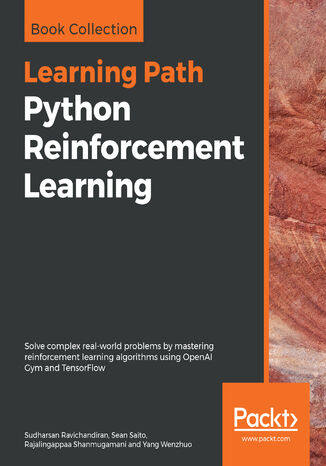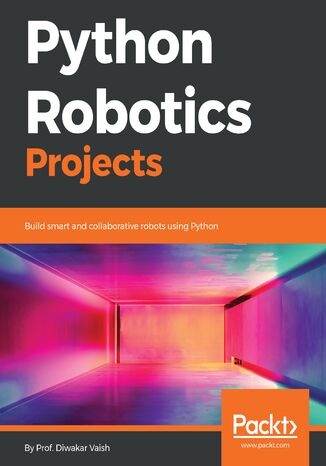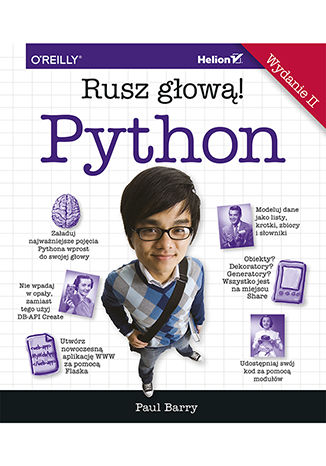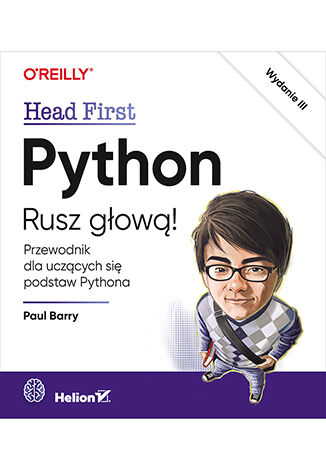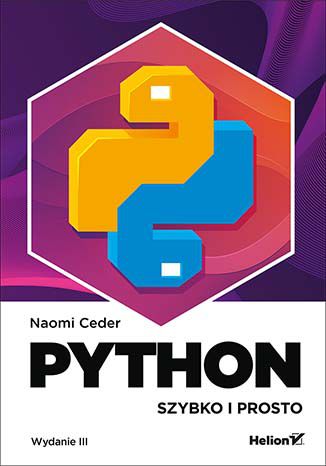Python
Python. Programowanie funkcyjne
Steven F. Lott
Zgodnie z paradygmatem programowania funkcyjnego największy nacisk należy kłaść na stałe i funkcje. Polega to na konstruowaniu funkcji oraz na obliczaniu wartości wyrażeń. W ten sposób otrzymuje się kod odporny na błędy. Python nie jest w pełni funkcyjnym językiem programowania, jednak pozwala na taki sposób pisania programów. Dzięki temu umożliwia tworzenie zwięzłego i eleganckiego kodu. Na przykład stosowanie wyrażeń generatorowych w Pythonie sprawia, że tworzone programy działają szybciej, ponieważ zużywają mniej zasobów. Niezależnie więc od stosowanego paradygmatu warto zapożyczyć pewne elementy programowania funkcyjnego i wykorzystać je do tworzenia ekspresyjnych i zwięzłych aplikacji w Pythonie. To znakomity podręcznik dla programistów, którzy chcą wykorzystać techniki i wzorce projektowe z funkcyjnych języków programowania, aby tworzyć w Pythonie zwięzłe, eleganckie i ekspresyjne programy - z czytelnym i łatwym w utrzymaniu kodem. Zawiera ogólny przegląd koncepcji funkcyjnych oraz wyjaśnia tak istotne pojęcia jak funkcje pierwszej klasy, funkcje wyższego rzędu, funkcje czyste, leniwe wartościowanie i wiele innych. Wnikliwie omawia sposób korzystania z tych funkcji w Pythonie 3.6, a także techniki przygotowywania i eksploracji danych. Ponadto pokazuje, w jaki sposób standardowa biblioteka Pythona pasuje do funkcyjnego modelu programowania. Co ważne, w książce znalazło się kilka przykładów prezentujących w praktyce opisane koncepcje. W książce między innymi: podstawy modelu programowania funkcyjnego działania na kolekcjach danych i przetwarzanie krotek projektowanie dekoratorów biblioteka PyMonad usługi sieciowe a programowanie funkcyjne Python: kod funkcyjny i funkcjonalny!
Python. Programuj szybko i wydajnie
Micha Gorelick, Ian Ozsvald
Wydajne aplikacje w języku Python! Python to skryptowy język programowania istniejący na rynku od wielu lat — jego pierwsza wersja pojawiła się w 1991 roku. Przejrzystość kodu źródłowego była jednym z głównych celów Guida van Rossuma, twórcy tego języka. Dziś Python cieszy się dużą popularnością, co z jednej strony świadczy o jego przydatności, a z drugiej gwarantuje użytkownikom szerokie wsparcie społeczności programistów języka. Python jest elastyczny, dopuszcza różne style programowania, a dzięki temu znajduje zastosowanie w wielu miejscach świata IT. Jeżeli chcesz w pełni wykorzystać możliwości Pythona i tworzyć wydajne rozwiązania, to koniecznie zaopatrz się w tę książkę! Dzięki niej dowiesz się, jak wykorzystać profilowanie do lokalizowania „wąskich gardeł”, oraz poznasz efektywne techniki wyszukiwania danych na listach, w słownikach i zbiorach. Ponadto zdobędziesz wiedzę na temat obliczeń macierzowych i wektorowych oraz zobaczysz, jak kompilacja do postaci kodu C wpływa na wydajność Twojego rozwiązania. Osobne rozdziały zostały poświęcone współbieżności oraz modułowi multiprocessing. Opanowanie tych zagadnień pozwoli Ci ogromnie przyspieszyć działanie Twojej aplikacji. Na sam koniec nauczysz się tworzyć klastry i kolejki zadań oraz optymalizować zużycie pamięci RAM. Rozdział dwunasty to gratka dla wszystkich — zawiera najlepsze porady specjalistów z branży! Książka ta jest obowiązkową lekturą dla wszystkich programistów chcących tworzyć wydajne rozwiązania w języku Python. Poznaj lepiej narzędzia numpy i Cython, a także narzędzia profilujące Dowiedz się, jak w języku Python dokonywana jest abstrakcja bazowej architektury komputera. Użyj profilowania do znajdowania „wąskich gardeł” związanych z wykorzystaniem czasu procesora i pamięci. Utwórz wydajne programy, wybierając odpowiednie struktury danych. Przyspiesz obliczenia oparte na macierzach i wektorach. Zastosuj narzędzia do kompilacji kodu Python do postaci kodu maszynowego. Zarządzaj jednocześnie wieloma operacjami obliczeniowymi i operacjami wejścia-wyjścia. Przekształć kod przetwarzania współbieżnego w celu uruchomienia go w klastrze lokalnym lub zdalnym. Rozwiąż duże problemy, używając mniej pamięci RAM. Wyciśnij z Pythona siódme poty!
Python. Receptury. Wydanie III
David Beazley, Brian K. Jones
Python to język programowania z ponad 20-letnią historią. Opracowany na początku lat 90. ubiegłego wieku, błyskawicznie zdobył sympatię programistów. Jest używany zarówno do pisania przydatnych skryptów czy małych narzędzi, jak i do pracy nad dużymi projektami. Korzysta z automatycznego zarządzania pamięcią oraz pozwala na podejście obiektowe i funkcyjne do tworzonego programu. Wokół języka Python skupiona jest bardzo silna społeczność programistów. Ta książka to sprawdzone źródło informacji na temat Pythona i jego najczęstszych zastosowań. Należy ona do cenionej serii „Receptury”, w której znajdziesz najlepsze sposoby rozwiązywania problemów. Przekonaj się, jak wydajnie operować na strukturach danych, łańcuchach znaków, tekście i liczbach. Zobacz, jak korzystać z iteratorów i generatorów. Ponadto naucz się tworzyć własne klasy i funkcje oraz sprawdź, jak uzyskać dostęp do plików i sieci. Te i dziesiątki innych receptur opisano w tej książce. To obowiązkowa pozycja na półce każdego programisty pracującego z językiem Python. Dzięki tej książce: rozwiążesz w optymalny sposób najczęstsze problemy napiszesz program korzystający z puli wątków będziesz lepszym programistą Pythona! Najlepsze rozwiązania typowych problemów!
Sudharsan Ravichandiran, Sean Saito, Rajalingappaa Shanmugamani, Yang...
Reinforcement Learning (RL) is the trending and most promising branch of artificial intelligence. This Learning Path will help you master not only the basic reinforcement learning algorithms but also the advanced deep reinforcement learning algorithms.The Learning Path starts with an introduction to RL followed by OpenAI Gym, and TensorFlow. You will then explore various RL algorithms, such as Markov Decision Process, Monte Carlo methods, and dynamic programming, including value and policy iteration. You'll also work on various datasets including image, text, and video. This example-rich guide will introduce you to deep RL algorithms, such as Dueling DQN, DRQN, A3C, PPO, and TRPO. You will gain experience in several domains, including gaming, image processing, and physical simulations. You'll explore TensorFlow and OpenAI Gym to implement algorithms that also predict stock prices, generate natural language, and even build other neural networks. You will also learn about imagination-augmented agents, learning from human preference, DQfD, HER, and many of the recent advancements in RL.By the end of the Learning Path, you will have all the knowledge and experience needed to implement RL and deep RL in your projects, and you enter the world of artificial intelligence to solve various real-life problems.This Learning Path includes content from the following Packt products:• Hands-On Reinforcement Learning with Python by Sudharsan Ravichandiran• Python Reinforcement Learning Projects by Sean Saito, Yang Wenzhuo, and Rajalingappaa Shanmugamani
Python Robotics Projects. Build smart and collaborative robots using Python
Prof. Diwakar Vaish
Robotics is a fast-growing industry. Multiple surveys state that investment in the field has increased tenfold in the last 6 years, and is set to become a $100-billion sector by 2020. Robots are prevalent throughout all industries, and they are all set to be a part of our domestic lives. This book starts with the installation and basic steps in configuring a robotic controller. You'll then move on to setting up your environment to use Python with the robotic controller. You'll dive deep into building simple robotic projects, such as a pet-feeding robot, and more complicated projects, such as machine learning enabled home automation system (Jarvis), vision processing based robots and a self-driven robotic vehicle using Python.By the end of this book, you'll know how to build smart robots using Python.
Python. Rusz głową! Wydanie II
Paul Barry
Python, prosty, wszechstronny i elastyczny język programowania, nadaje się zarówno do pisania niedużych skryptów, wielkich systemów, jak i do wysoce specjalistycznych zadań, jak choćby analiza danych do celów naukowych. To ulubione narzędzie coraz liczniejszej rzeszy znakomitych programistów. Wiele osób próbuje się uczyć Pythona, jednak mimo różnorodnych podręczników i kursów nauka pisania poprawnego, wydajnego i przejrzystego kodu w tym języku wciąż sprawia problemy. Ta książka jest doskonałym podręcznikiem Pythona. Poza podstawami języka opisano tu sposoby posługiwania się Pythonem w prawdziwym świecie podczas pisania kodu aplikacji WWW czy obsługiwania baz danych. Przedstawiono tu również dość trudne tematy, takie jak kolekcje i niemodyfikowalność. Co ciekawe, materiał do książki przygotowano w szczególny sposób, posługując się metodami nowoczesnej kognitywistyki i dydaktyki, które uwzględniają specyfikę pracy ludzkiego mózgu, aktywnie go angażując podczas nauki. W ten sposób Python wchodzi do głowy niepostrzeżenie, w szybki, zabawny i interesujący sposób! W tej książce: szybkie wprowadzenie do Pythona korzystanie z danych i z baz danych praktyczne projektowanie aplikacji WWW zarządzanie kontekstem wątki, wyjątki i iteracje w Pythonie narzędzia, biblioteki i moduły przydatne programiście Pythona Jest problem? Rusz głową i zaprogramuj to w Pythonie! Paul Barry pochodzi z Belfastu. Obecnie mieszka wraz z rodziną w niewielkim miasteczku Carlow w Irlandii Północnej. Od 1997 roku wykłada w Instytucie Technologicznym w Carlow. Przedtem (w Irlandii i Kanadzie) zajmował się rozwiązaniami IT dla opieki zdrowotnej. Barry jest ekspertem w dziedzinie programowania w Pythonie i w Perlu. W przeszłości był stałym współpracownikiem „Linux Journal Magazine”, napisał także kilka książek o programowaniu.
Python. Rusz głową! Wydanie III
Paul Barry
Python jest wyjątkowy! Umożliwia nie tylko tworzenie rozbudowanych aplikacji, ale również rozwiązywanie złożonych problemów. Korzystają z niego programiści, analitycy danych, naukowcy, inżynierowie, specjaliści od sztucznej inteligencji i profesjonaliści z wielu innych dziedzin. Przystępność i uniwersalność Pythona sprawiają, że jest jednym z najchętniej używanych języków programowania. Jeśli przed zagłębieniem się w tajniki kodowania powstrzymywała Cię obawa przed nudnym wertowaniem nieciekawych podręczników, to właśnie trzymasz w rękach książkę, która jest dla Ciebie! Ta pozycja, podobnie jak inne z serii Rusz głową!, została przygotowana zgodnie z jedyną w swoim rodzaju metodyką nauczania, wykorzystującą zasady funkcjonowania ludzkiego mózgu. Dzięki zagadkom, tajemniczym historiom, angażującym ćwiczeniom i przystępnie podanej wiedzy bez trudu przyswoisz nawet dość złożone koncepcje, takie jak programowanie zorientowane obiektowo, aplikacje sieciowe czy uczenie maszynowe. Znajdziesz tu zabawne i niekonwencjonalne ilustracje, świetne analogie, a w toku nauki krok po kroku zbudujesz własną aplikację. Przekonasz się, że to absolutnie wyjątkowy i niezwykle skuteczny podręcznik! Dzięki tej książce: opanujesz podstawy Pythona, w tym zmienne, typy danych, struktury danych i algorytmy zgłębisz tajniki funkcji, obiektów, klas i dziedziczenia przyswoisz zasady organizacji kodu w moduły i pakiety nauczysz się testować i debugować kod dowiesz się, jak używać baz danych w aplikacjach poznasz podstawy uczenia maszynowego w Pythonie Jeśli Python jest na Twojej liście rzeczy do zrobienia, to zacznij od tej książki! Daniel Hinojosa - programista, instruktor, prezenter
Python. Szybko i prosto. Wydanie III
Naomi Ceder
Na początku, w 1989 roku, był tylko wakacyjnym projektem Guida van Rossuma. Dziś jest potężnym językiem programowania o niesamowitej wszechstronności: można się nim posłużyć do napisania skryptu ułatwiającego prace administratora sieci, stworzenia aplikacji internetowej, a także opracowania systemu głębokiego uczenia maszynowego. Co więcej, dookoła Pythona skupiła się międzynarodowa społeczność tworząca niesamowite biblioteki i frameworki, co przenosi programowanie w Pythonie na zupełnie inny poziom. Ten język ma i taką ważną zaletę, że jego nauka jest przyjemna i angażująca. Nawet początkujący programista może bardzo szybko zacząć pisać poprawny i dobrze działający kod. Dzięki tej książce zaczniesz błyskawicznie programować w Pythonie! Pominięto tu zbędne szczegóły, a skoncentrowano się na najważniejszych dla programisty, fundamentalnych zasadach programowania: przepływie sterowania, programowaniu zorientowanym obiektowo, dostępie do plików czy obsłudze wyjątków. Liczne porady, wskazówki i obszerne przykłady pomogą Ci w opanowaniu poszczególnych zagadnień. Poza omówieniem Pythona, jego najważniejszych bibliotek, pakietów i narzędzi w tym wydaniu znajdziesz pięć nowych rozdziałów dotyczących data science. Praca z tym podręcznikiem sprawi, że szybko będziesz gotów nawet na bardzo trudne zadania - i w pełni wykorzystasz potencjał Pythona! W tej książce między innymi: wprowadzenie do Pythona i przygotowanie IDLE - środowiska pracy tworzenie kodu niezależnego od platformy dostęp do relacyjnych i nierelacyjnych baz danych obsługa wyjątków i praca na plikach pakiety w Pythonie Python: język elegancki, wszechstronny, elastyczny!

